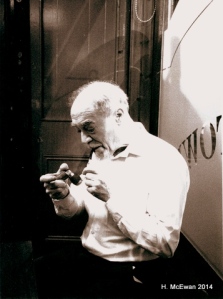Families are the best. No, really. They successfully, effortlessly, solve the Jungian psyche’s yearning for a balanced state of consciousness and unconsciousness. And, financially, it costs (unless you have teenagers) nothing.
Within family groups fathers have possibly the most misunderstood roles. Now I don’t want to get into mean-level parenting differences between men and women, or indeed anything that would agitate the fairer sex. But, men play a hugely differentiated role. And do it rather well.
In social situations, sports teams, even politics: father figures arise, indeed are thrust into prominence and are revered by followers. Gandhi, Churchill, even Pat Morita (in Karate Kid) are revered in their own sphere of influence. Not just as great politicians or even leaders or sportsmen, but as a reliable safe pair of hands who can set an example, mentor younger people, give reasoned advice and just “do the right thing”.
Norrie was an unlikely candidate for such a role. Indeed he was supremely clever, articulate, an understated fencing coach and left handed. (A big plus!). He was also cantankerous, outspoken, irreverent, profane, a ‘ladies man’ (in a charming, old school way) and had a propensity to become ‘tired and emotional’ as Victorians were wont to say.
Our team had been in financial turmoil, falling membership and riven with apathy. Norrie showed up and things seemed to change almost immediately.
Now I’m not suggesting he was some sort of Clarence Odbody out of “It’s a Wonderful Life”, but he was somehow other-worldly. Mephistophelean goatee, sartorially acceptable and a pipe-smoker. Well, it did it for the team. Through a fug of pipe-smoke, beery breath and Rabelaisian encouragement, a motley collection of disinterested individuals began to have belief in their ability. Competitions beckoned. Wins began to accumulate. Notice was taken.
All this time, the time when bonding was strongest, Norrie’s own abilities were waning. Messy divorce took it’s toll. As did redundancy. Still the performances improved, the place was happier. Norrie’s own difficulties were masked, and at that point we didn’t concern ourselves. Well you don’t, do you? Norrie was travelling his Jungian middle passage completely unconsciously. As unaware of impeding crisis as we were. Norrie’s life crises were as meaningless to his team in the throws of youth and adolescence, as they were to his own self. Still he surprised us. captaining winning teams, and becoming the first local fencer to represent Scotland in the veteran category aged sixty. Just as Mr Jung asserts that we can only despair as the ageing Lothario paddles his canoe into the sunset with his twenty something girl; only the Lothario is blind to the fact he’s heading for rapids downstream. In Norrie’s case the toll of social, personal and economic upheaval he suffered led to a marked escalation in his own destructive behaviours. He never saw the rapids coming; neither did we.
People need parents. Not just the nurturing, the care, the safety they provide. They need a psychological shield which provides imagined protection from ‘the next life’. Once parents are gone, then as it goes, you’re bumped up the queue. Norrie provided this protection for the team. As long as he was there, no one else had to step up. Take responsibility. Even care. His own individuation was hampered by lack of self-care and commitment to his friends. Steadily, as his powers waned, the team produced more International recognition, medals, honours.
Then he stopped coming.
And like families do when the parental figure departs, the club slowly but inexorably began to drift apart. And at any reunions, just like families do, the old stories would be recited verbatim. Like Norse sagas: terrifying, yet with a strange longing even though everyone knows them all.
Yet this particular saga would have been incomplete without finding out what had become of him. The successful club he mentored has long since ceased to exist. The individuals, too, often no longer in touch with each other. Creating their own mysteries as they stride forth towards that day where their lifetime watersheds begin. But Norrie?
Now in council sheltered care, and in his mid-eighties, I found him as sharp as ever. Not misty-eyed for the ‘old days’. More a sanguine reality for his present state. Still getting about unaided, he asked if I’d care to meet again soon and perhaps go out.
I agreed, of course.
Families are best. Each and every family you belong to.


Thank you for stopping by at my blog and for liking one of my posts. May the Lord richly bless you in the name of Jesus Christ.
LikeLike